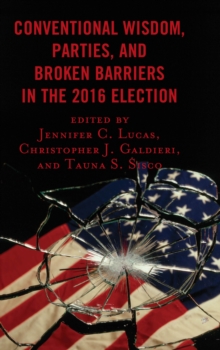Description
| Product ID: | 9781498566636 |
| Product Form: | Paperback / softback |
| Country of Manufacture: | US |
| Title: | Conventional Wisdom, Parties, and Broken Barriers in the 2016 Election |
| Authors: | Author: Christopher J. Galdieri, Tauna Starbuck Sisco, Jennifer C. Lucas |
| Page Count: | 272 |
| Subjects: | Elections and referenda / suffrage, Elections & referenda, Political structures: democracy, Political parties and party platforms, Political structures: democracy, Political parties, USA, c 2010 to c 2020 |
| Description: | This book examines whether the 2016 presidential election challenged conventional wisdom in political science or strengthened current theories. Political scientists examine topics ranging from voter trends, election issues, political parties, and congressional elections to see whether Trump’s victory was truly as unconventional as many assume. The 2016 presidential election was unconventional in many ways. The election of President Donald Trump caught many by surprise, with a true outsider — a candidate with no previous governmental experience and mixed support from his own party — won the election by winning in traditionally Democratic states with coattails that extended to Republican Senate candidates and resulted in unified Republican government for the first time since 2008. This result broke with the pre-election conventional wisdom, which expected Hillary Clinton to win the presidency and a closer Senate divide. This surprising result led many political scientists to question whether 2016 truly marked a major turning point in American elections as portrayed in the media — a break from the conventional wisdom – or whether it was really the exception that proved the rule. In this volume, political scientists examine previous theories and trends in light of the 2016 election to determine the extent to which 2016 was a break from previous theories. While in some areas it seems as though 2016 was really just what would have been predicted, in others, this election and the new president pose significant challenges to mainstream theories in political science. In particular, prominent political scientists examine whether voter trends, with particular focus on groups by gender, age, geography, and ethnicity, and election issues, especially the role of the Supreme Court, followed or bucked recent trends. Several political scientists examine the unconventional nomination process and whether this signals a new era for political parties. The role of conspiracy theories and voter confidence in the administration of elections are also discussed. Finally, contributors also examine the indirect effect the presidential candidates, especially Trump, played in congressional election rhetoric. |
| Imprint Name: | Lexington Books |
| Publisher Name: | Lexington Books |
| Country of Publication: | GB |
| Publishing Date: | 2020-02-06 |


